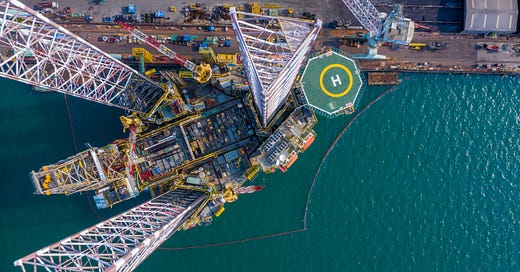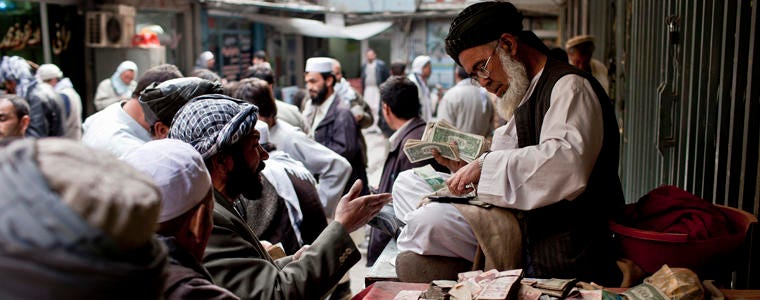Emerging Markets Daily - August 27
OPEC+ To Stick to Output Hikes, Brazil Political Tensions, Leaders Flock to Baghdad for Regional Summit, Afghanistan Economy, China EV Brand Attracts $500 Million
The Top 5 Stories Shaping Emerging Markets from Global Media - August 27
As Oil Prices Rise, OPEC+ Seen As Sticking to Output Hikes
Bloomberg
“OPEC and its allies are expected to press on with their planned revival of oil production when they meet next week, as prices bounce back from their August stumble.”
“The coalition led by Saudi Arabia and Russia is gradually restoring the vast amount of crude production halted during the pandemic, and will probably ratify the next monthly installment when it gathers on Sept. 1, according to a Bloomberg survey of traders and analysts. Several OPEC+ delegates privately predict the same outcome.”
“Crude markets faltered earlier this month as the resurgent pandemic threatened demand in China and the U.S. But prices have since recovered after fuel use proved resilient to the latest coronavirus wave, giving the Organization of Petroleum Exporting Countries and its partners more breathing space.”
“‘Uncertainties over the world economy and the growth recovery in China have largely peeled away,’ said Ed Morse, head of commodities research at Citigroup Inc. ‘There’s good evidence that the bottom in oil prices was temporary and overdone, and if the recovery continues, OPEC+ would likely stick to the plan.’”
“The cartel has already restarted roughly 45% of the unprecedented production volume shuttered last spring. Under a plan spearheaded by Saudi Energy Minister Prince Abdulaziz bin Salman, OPEC+ will return the rest in monthly increments of 400,000 barrels a day.” Bloomberg reports.
Brazil Markets Shaken By Political Tensions, Economic Questions
Financial Times
”Investor sentiment in Brazil has been knocked by rising political tensions together with concerns over the recovery and public spending in Latin America’s biggest economy.”“The country’s currency and stocks bourse have come under pressure in recent weeks against a backdrop of clashes between Jair Bolsonaro and top judges over the president’s unproven accusations of voter fraud. A bounce this week has not fully reversed the dip…”
“The Ibovespa share index, meanwhile, has tumbled almost 9 per cent since touching a record high 11 weeks ago, though it is slightly up so far in 2021 both in local currency and dollar terms…”
“Paulo Bilyk, chief executive of Rio Bravo Investimentos, which has R$13bn of assets under management, cited the government’s weakened political position. ‘They are having a very difficult time governing and the implication of their mistakes is that their popularity has been declining. Consequently we have increasing radicalisation of speeches and acts. None of this is good for markets.’” Michael Pooler and Bryan Harris report.
Geopolitics: Baghdad-hosted Regional Summit Attracts Top Leaders
Al Jazeera
“Officials from around the Middle East began arriving in Baghdad, Iraq, on Friday ahead of a summit aiming to promote peace and reconciliation in the region, including improving ties between arch rivals Iran and Saudi Arabia.”
“The Saturday meeting seeks to give Iraq a ‘unifying role’ to tackle the crises shaking the region, according to sources close to Iraqi Prime Minister Mustafa al-Kadhimi.”
“Iranian Foreign Minister Hossein Amir-Abdollahian left for Iraq to participate in the Baghdad summit, the ministry said. His ministry spokesman Saeed Khatibzadeh announced the departure to the “meeting to support Iraq” in a short statement.”
“The Islamic republic’s new President Ebrahim Raisi was invited to the Baghdad meeting, but it was not clear if he would attend. Egyptian President Abdel Fattah el-Sisi and Jordan’s King Abdullah II have said they will attend, as has French President Emmanuel Macron, the only official expected from outside the region. Leaders from Saudi Arabia and Turkey were also invited.”
“Iraq is seeking to establish itself as a mediator between Arab countries and Iran. Baghdad has been brokering talks since April between regional heavyweights Riyadh and Tehran on mending ties severed in 2016.”
“Raisi, who took office last week, has said he sees ‘no obstacles’ to restoring ties with Riyadh. He has made improving relations with regional countries one of his priorities.” Al Jazeera reports.
Afghanistan On Verge of Economic Collapse, Experts Say
NBC News
“Afghanistan’s economy is headed toward collapse without swift action from the international community, experts have warned.”
“The country’s cash-based economy was struggling before the Taliban’s recent ascension, and the Islamic movement’s sudden takeover has left the country’s finances in limbo — with assets frozen, banks closed and crucial foreign aid stalled.”
“There’s little faith that the hard-line Taliban will be able to turn things around…”
“Shortly after President Ashraf Ghani’s government fell on Aug. 15, trading in the afghani, the country’s currency, slumped, falling by almost 8 percent against the U.S. dollar. But since Aug. 17, the local currency has been relatively stable, probably because it has been practically frozen — it is now nearly impossible to move money in or out of the country.” Cyrus Farivar reports.
China Premium EV Brand Zeekr Raises $500 Million; Intel Among Investors
South China Morning Post
“Zeekr, a premium electric vehicle (EV) brand owned by China’s leading carmaker Geely, has secured funding from a clutch of investors including US chip maker Intel to reinforce its development of next-generation cars.”
“Hong Kong-listed Geely Automobile said in an exchange filing on Friday that Zeekr raised a combined US$500 million from five investors – Intel, battery producer CATL, online entertainment firm Bilibili, Cathy Fortune Corporation, an investor in mining businesses and private equity firm Boyu Capital.”
“They will jointly own 5.6 per cent of Zeekr, established by Geely Automobile and its parent Zhejiang Geely Holding Group in March with a total capital of 2 billion yuan (US$308.7 million).”
“Before the financing, the Hong Kong-listed unit held 51 per cent of Zeekr while the parent, which also owns Volvo Cars and a big stake in Daimler AG, held the remaining 49 per cent.” Daniel Ren reports.





